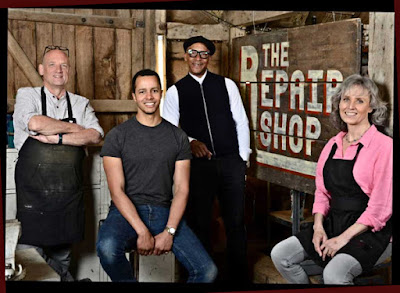Love That Does Not Need Repair!
Dear Reader,
Well, do you watch The Repair Shop?! If not, have a little look at this short video.
This show has graduated from BBC2 to prime-time BBC1, and for the past week and coming week(s) has also been allocated a daily late afternoon slot on every weekday!
It must be good!
There is no doubting the wonderful skills of all those several master craftsmen and women that offer their skills to providing - free of charge - repair services to the general public of their prized memorabilia. Anyone who has watched Lucia and her painting restoration and the others displaying their woodwork, mechanical or precious stones restoration capabilities would surely be bowled over by their results. I am not too bothered about the teddy bears, but they know how to repair those, too!
The standard response from every satisfied customer has always been "Wow!!"
This week, I choose to use The Repair Shop as a theme as I believe it brings to our notice a valuable something that I thought was on the point of disappearing from our way of life - the craftsman (or woman).
Just why is craftsmanship so valuable? Not just because of the service they offer but because the true craftsperson will find something eminently satisfying in their work that is a manifestation of love - the key ingredient to a happy life. And through the successful demonstration of their work they can illicit thankfulness and joy from the people they provide the service to.
I became aware fairly early in my life of craftsmanship in my own family, and the ability of my father to be able to repair things. Sometimes, for example, the old-style family clock would be disassembled on the dinner table, and there would be all the parts laid out carefully across the table on newspaper, all waiting, in their turn, my father's hand in cleaning them. Then he would put them all back together again to restore a working clock.
My father was an amateur cabinet maker and general carpenter too, and he would spend many hours working in his shed on some item - all in addition to well-maintaining long front and back gardens. He could draw and maintain his own car, too. And this in the context of working for a living in a physical job that occupied more than 5 days a week of his time until he was nearly 50, when he switched to a different line that was not physically demanding. Oh, and he got 5 working days' paid holiday per year.
In turn, his father and his grandfather before him - and generations of their forebears - had been craftsmen and had worked for a living as cabinet makers and carpenters. One of them worked on what was then the new Westminster Bridge in the middle of the 19th c., whilst his youngest brother - my great-grandfather - set up business as a clockcase maker, a business in which he employed all his three sons and a daughter.
So it was this tradition that influenced me in my career as a computer systems developer. Not quite the same thing as making a beautiful item out of wood and suchlike, but still a profession that required a keen interest in the development of a good product. My father brought me up to know that "a good craftsman never blames his tools" and to take care in the development of the end-product.
This approach to work is the difference between just doing a job and taking interest in the job. The result - and the satisfaction - is invariably of a better quality. This attitude towards work makes life that much more meaningful rather than doing it just for money
I would suggest that such an approach to work (any work) - in its fullest expression - is a form of love. And here we can take the theme a step further: if the work is devoted as an expression of one's love for one's maker (God), then such work receives the fullest blessing.
Thank you for reading this.

Comments
Post a Comment